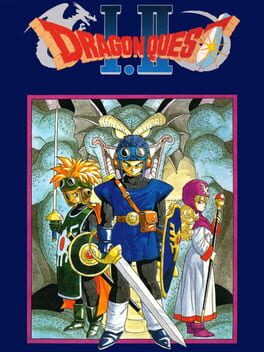Beaten: Dec 09 2021
Time: 07ish Hours
Platform: GB (via GBA)
(For DQ1)
I can’t tell if there’s a lot to say or not that much to say about this game. All of its innovations are at the heart of pretty much every JRPG that followed, but also (almost) every JRPG that followed, especially the other DQ games, has expanded upon this game to such a degree that most of what’s here feels incredibly basic.
Let’s start with what still feels fresh and good to me. The battle system is a good starting point for that. It’s not the greatest battle system in a JRPG, and the fact that you have one party member limits it significantly, but the game is balanced properly around that simplicity. What shines through is pure, unadulterated, well thought out math. No other system since has leaned so hard on its implementation like this. It takes the messy and impenetrable math of D&D and cuts it down, rebalances it, and makes it really work. This, above all else, is where DQ1’s value still rests, even today. The dungeon design is also rather good, still seen echoed most strongly in Pokemon, by my measure. These are mazes, through and through, exactly as would have been seen in games like Wizardry and Ultima, but they’re not sprawling in that way. They’re navigable and understandable, but still feel appropriately mazeish and winding. They feel great, if a little on the empty side.
On to what hasn’t aged great, there’s the progression for one. Lots of NES JRPGs followed after DQ’s rumor-based style, where you need to talk to everybody in every town to even get a whiff of the plot. It’s not bad per se, but even with this style I prefer the stronger narrative and more straightforward pacing of something like FF2.
There’s also some things that just feel outdated. You can only save at a central town. The item limit is rather stringent. The interface feels more modern than you’d think, but what’s here is still absolutely the barest core of a JRPG, and everything that’s been cut down from it’s forebears to fit on a console, or built up by it’s progeny, stands out starkly. It’s worth playing for the history and the bizarrely satisfying math, but if that doesn’t interest you, then I don’t blame you for not picking it up.
Time: 07ish Hours
Platform: GB (via GBA)
(For DQ1)
I can’t tell if there’s a lot to say or not that much to say about this game. All of its innovations are at the heart of pretty much every JRPG that followed, but also (almost) every JRPG that followed, especially the other DQ games, has expanded upon this game to such a degree that most of what’s here feels incredibly basic.
Let’s start with what still feels fresh and good to me. The battle system is a good starting point for that. It’s not the greatest battle system in a JRPG, and the fact that you have one party member limits it significantly, but the game is balanced properly around that simplicity. What shines through is pure, unadulterated, well thought out math. No other system since has leaned so hard on its implementation like this. It takes the messy and impenetrable math of D&D and cuts it down, rebalances it, and makes it really work. This, above all else, is where DQ1’s value still rests, even today. The dungeon design is also rather good, still seen echoed most strongly in Pokemon, by my measure. These are mazes, through and through, exactly as would have been seen in games like Wizardry and Ultima, but they’re not sprawling in that way. They’re navigable and understandable, but still feel appropriately mazeish and winding. They feel great, if a little on the empty side.
On to what hasn’t aged great, there’s the progression for one. Lots of NES JRPGs followed after DQ’s rumor-based style, where you need to talk to everybody in every town to even get a whiff of the plot. It’s not bad per se, but even with this style I prefer the stronger narrative and more straightforward pacing of something like FF2.
There’s also some things that just feel outdated. You can only save at a central town. The item limit is rather stringent. The interface feels more modern than you’d think, but what’s here is still absolutely the barest core of a JRPG, and everything that’s been cut down from it’s forebears to fit on a console, or built up by it’s progeny, stands out starkly. It’s worth playing for the history and the bizarrely satisfying math, but if that doesn’t interest you, then I don’t blame you for not picking it up.
